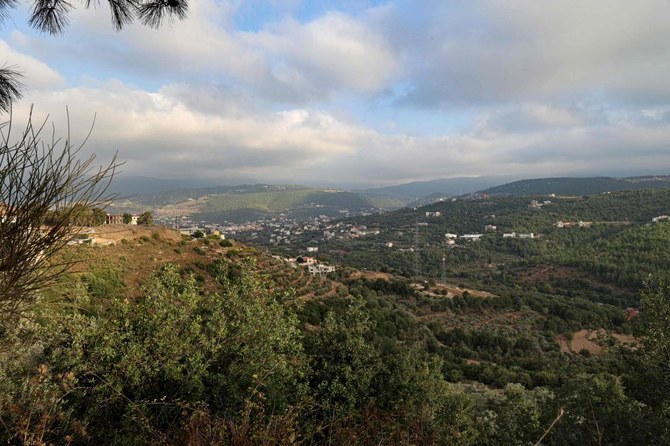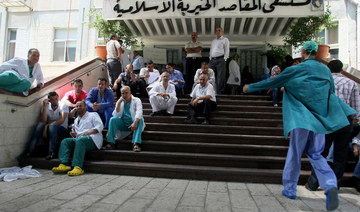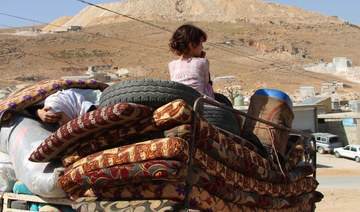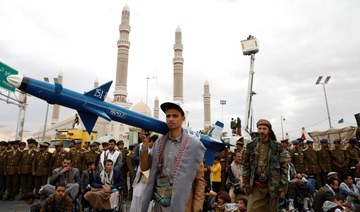KOBAYAT, Lebanon: Heatwaves, low rainfall and the threat of wildfires are compounding the woes of people in the forested north of Lebanon, a country where economic pain has long taken prominence over environmental concerns.
After a blistering and dry summer, residents of the mountainous Akkar region near the Syrian border are voicing fears about climate change and water scarcity.
Farmer Abdullah Hammud, 60, has spent his life in the green hills of Akkar, growing everything from tomatoes to figs, but says environmental problems are now hurting his livelihood.
“I’ve never seen it this hot,” Hammud said, looking at a field where he was planning to grow cabbage. “We lost part of the crops.”
With Lebanon’s mains water supply unreliable at best, he depends on a nearby spring for irrigation, but worries that the supply is falling.
Because trucking in water for his house and farm is not an option, he said, “if the water ran out, we would have to leave.”
Rainfall has been below average this year in Lebanon, Mohamad Kanj from the meteorological department told AFP.
A 13-day heatwave last month was “the most severe recorded in terms of the number of days, the area affected and the exceptional temperatures.”
Akkar was already one of Lebanon’s most disadvantaged regions before the national economy imploded in late 2019, plunging much of the population into poverty.
A report from the American University of Beirut last year found the region also has only low-to-moderate resilience to climate change.
Devastating forest fires raged two years ago near the town of Kobayat, where houses are nestled among the trees in surrounding hills.
A 15-year-old died while helping to battle the flames.
“The fires affected us a lot,” said Najla Chahine, 58, a former teacher. “We feared for our lives.”
Since those fires, “there’s more awareness,” said Chahine, noting however that the local community needs to work harder to face environmental threats because “the state is absent.”
She and her son Sami were on a hike as part of a recent local festival.
Several dozen people clambered up and down tree-covered slopes carpeted with dry pine needles and cones.
Sami Chahine, 13, said he has tried to “raise awareness as much as possible” about environmental issues among his friends.
He expressed worry about fires, but also other ecological threats such as pollution, in a country where people often burn trash at informal dump sites and recycling is sporadic.
The hike passed several local springs, one reduced to just a trickle, another totally dry.
Antoine Daher, head of the local non-governmental Council of Environment — Kobayat, blamed the water shortages on both a lack of rain and rising demand, urging people to reduce consumption.
Daher said his association set up Lebanon’s first fire watchtower some 25 years ago and had sought to educate people on ecological topics.
Despite Lebanon’s devastating economic crisis, he said, “we mustn’t see the environment as a luxury.”
Fires remain a major threat, and Khaled Taleb from the Akkar Trail association was training a group on how to prevent and fight them.
“We are currently at the peak of the fire season,” he said, warning that the risk only abates in late October.
His association, which now counts 15 volunteers, turned to firefighting in 2020 after major blazes hit the Akkar region.
The area is covered with 200 square kilometers (77 square miles) of forest and home to 73 out of Lebanon’s 76 tree species, he said.
The fires near Kobayat in 2021 alone “destroyed more than 1,800 hectares (4,450 acres),” he said, recalling that water access was a major problem for his team.
In October 2019, the Beirut government’s failure to contain devastating wildfires was among the triggers of an unprecedented, nationwide anti-government protest movement.
Lebanon “doesn’t have the logistical capabilities to deal with a huge fire,” said Taleb, whose group works alongside the civil defense and other first responders.
However, he expressed optimism at the local community’s willingness to pitch in.
“We weren’t born firefighters,” he said, adding that until three years ago, “we didn’t know anything about firefighting.”
“But our main priority now is to protect the forest from all threats.”
Heat, drought, fires threaten Lebanon’s northern forests
https://arab.news/496bz
Heat, drought, fires threaten Lebanon’s northern forests

- Rainfall has been below average this year in Lebanon
- A 13-day heatwave last month was “the most severe recorded in terms of the number of days, the area affected and the exceptional temperatures”
Tunisia reports increase in migrant interceptions

- The National Guard also said it had prevented 21,462 people from entering Tunisia across its borders with Algeria in the west and Libya in the east, four times the 5,256 number from last year
TUNIS: Tunisia on Sunday reported a 22.5 percent rise in the number of migrants “intercepted on shore or rescued at sea” as they attempted to cross the Mediterranean to Italy.
The National Guard reported that more than 21,000 people had been prevented from leaving Tunisian shores or had been rescued during the first four months of 2024.
A press statement from the National Guard, which also overseas Coast Guard operations, said 21,545 people were intercepted between January 1 and April 30, compared with 17,576 over the same period last year.
It said the interceptions occurred in an equivalent number of operations — 751 this year and 756 in 2023.
Tunisia and neighboring Libya have become key departure points for migrants, often from sub-Saharan African countries, who risk perilous Mediterranean sea journeys in the hopes of a better life in Europe.
Since January 1, the bodies of 291 shipwreck victims have been recovered compared with 572 last year in almost triple the number of operations (1,967 this year against 686 in 2023), the statement said.
The National Guard also said it had prevented 21,462 people from entering Tunisia across its borders with Algeria in the west and Libya in the east, four times the 5,256 number from last year.
The number of alleged smugglers and their accomplices detained more than doubled, with 529 arrests and 261 prosecutions, up from 203 and 121 respectively last year.
Sfax, the North African country’s second city, remained the main point of departure for clandestine attempts to reach the Italian island of Lampedusa less than 150 kilometers (90 miles) away.
The National Guard said 19,457 would-be migrants were prevented from making the perilous journey in the first four months of 2024, as opposed to 15,468 last year.
Last year many thousands of people from sub-Saharan countries fleeing poverty and conflict, notably in Sudan, and thousands of Tunisians seeking to escape the country’s economic and political crisis attempted to make the crossing.
At Italian instigation, the European Union signed an agreement last summer to provide 255 million euros in financial aid to debt-ridden Tunisia in return for a commitment to curb migrant departures.
According to Romdhane Ben Amor, spokesman for the Tunisian Forum for Social and Economic Rights NGO, the state’s approach to the problem “is not one of rescue but of interception.”
A recent report by the UN’s International Organization for Migration said that over the past decade more than 27,000 migrants have died trying to make the crossing, over 3,000 of them in the past year alone.
Israel marks especially somber Memorial Day after Oct 7

- The annual day of commemoration has always weighed heavily on Israelis, who have fought numerous wars since Israel’s creation in 1948
JERUSALEM: Israelis stood still and flags flew at half-mast on Sunday as the country marked an especially painful Memorial Day following the carnage of the October 7 attack.
At 8:00 p.m. local time (1700 GMT), sirens sounded across Israel, prompting a minute’s silence in honor of its fallen soldiers and civilian victims of attacks.
“Tonight, we have no peace, and there is no silence,” President Isaac Herzog said at a special ceremony on Sunday evening at Jerusalem’s Western Wall, the holiest site where Jews can pray.
“I stand here, next to the remnants of our temple, in torn garments. This tearing, a symbol of Jewish mourning, it is a symbol of the mourning and sorrow of an entire people this year.”
The annual day of commemoration has always weighed heavily on Israelis, who have fought numerous wars since Israel’s creation in 1948.
However, following the attack by Palestinian militants on October 7 and the ensuing war in the Gaza Strip, which has now lasted more than seven months, the day has new meaning for many.
Top Israeli officials have repeatedly acknowledged failure in preventing the attack, and on Sunday evening army chief Herzi Halevi said he was “fully responsible” for what happened on October 7.
“Every day, I feel its weight on my shoulders, and in my heart I fully understand its significance,” he said at the Western Wall ceremony.
“I am the commander who sent your sons and daughters into battle, from which they did not return, and to positions from which they were kidnapped.”
As with Jewish religious holidays, Israelis commemorate Memorial Day from sunset into the following day, with several events planned at the country’s 52 military cemeteries.
Memorial Day comes ahead of the country’s 76th Independence Day on Tuesday, when Israelis celebrate the creation of their state.
Palestinians remember the creation of Israel as the “Nakba” or catastrophe, marking the expulsion of hundreds of thousands of people from their homes.
For Israelis this Memorial Day is a stark reminder of the October 7 attack.
“The spirit of the fallen holds the promise of our future,” Prime Minister Benjamin Netanyahu said at a separate ceremony marking the Memorial Day.
He said it was a “sacred mission to bring home all the hostages” held in Gaza.
Some 250 Israelis and foreigners were kidnapped by militants and taken to Gaza during the October 7 attack by Hamas.
Israel estimates that 128 are still being held captive there, including 36 who the military says are dead.
The Hamas attack itself resulted in the deaths of more than 1,170 people in Israel, mostly civilians, according to an AFP tally based on official Israeli figures.
“Today is like every other day we have experienced since October 7. We are all mourners,” said Reouven Adam, owner of a wine bar in Jerusalem.
Israel’s retaliatory military campaign aimed at eliminating Hamas in Gaza has killed at least 35,034 people, most of them women and children, according to the Hamas-run territory’s health ministry.
Israel has added more than 1,500 names to the list of soldiers and civilians killed in attacks this year since October 7.
Israel estimates that a total of 25,040 soldiers, members of the security forces and fighters have died on duty since 1860, when the first Jewish inhabitants of Jerusalem’s Old City created new neighborhoods outside the city walls.
Israelis are also paying tribute to 5,100 civilians killed in attacks since then, according to figures from the National Insurance Institute, which keeps the records.
The sirens will sound again on Monday at 11:00 local time, beginning a series of solemn events at Israeli military cemeteries.
These ceremonies will then pave the way for Independence Day festivities on Tuesday, the anniversary of the declaration of the State of Israel on May 14, 1948.
However some celebrations have been canceled this year because of the war in Gaza.
Israel turns its guns on northern Gaza again

JEDDAH/RAFAH: Israeli tanks and troops battled Hamas and Islamic Jihad fighters in central and northern Gaza on Sunday as the invading forces returned to parts of the enclave from which they had earlier pulled out after some Hamas militants regrouped in areas the military said it had cleared months ago.
Palestinians reported heavy Israeli bombardment overnight in the urban Jabaliya refugee camp and other areas in northern Gaza, which has been largely isolated by Israeli forces for months. UN officials say there is a “full-blown famine” there.
Residents said Israeli warplanes and artillery also struck the Zeitoun area east of Gaza City, where troops have battled militants for over a week. They have called on tens of thousands of people to relocate to nearby areas.
“It was a very difficult night,” said Abdel-Kareem Radwan, a 48-year-old from Jabaliya. He said they could hear intense and constant bombing since midday Saturday. “This is madness.”
First responders with the Palestinian Civil Defense said they were unable to respond to multiple calls for help from both areas, as well as from Rafah.
In central Gaza, staff at the Al Aqsa hospital in Deir Al-Balah said an Israeli strike killed four people.
Rear Adm. Daniel Hagari, the top Israeli military spokesman, said forces were also operating in the northern towns of Beit Lahiya and Beit Hanoun, which were heavily bombed in the war’s opening days.
“We have identified attempts by Hamas to rebuild its military capabilities in Jabalia, and we are acting to destroy these attempts, military spokesman Daniel Hagari said. There were also intense clashes and heavy gunfire from Israeli helicopters in the Zeitun area.
Hamas’ military wing said it shelled Israeli special forces east of Jabaliya and fired mortar shells at troops and vehicles entering the Rafah border crossing area.
“Hamas’ regime cannot be toppled without preparing an alternative to that regime,” columnist Ben Caspit wrote in Israel’s Maariv daily, channeling the growing frustration felt by many Israelis more than seven months into the war.
“The only people who can govern Gaza after the war are Gazans, with a lot of support and help from the outside.”
(With AP)
FASTFACT
35,034
Palestinians have been killed and 78,755 others wounded in Israel’s military offensive on Gaza since Oct. 7.
In Rafah, the exodus of Palestinians from Gaza’s last refuge accelerated Sunday as Israeli forces pushed deeper into the southern city.
Israel had begun a limited ground offensive in defiance of the US and other allies. Kuwaiti Hospital said it had received the bodies of 18 Palestinians killed in the past 24 hours.
The Health Ministry said at least 63 people had been killed over the past 24 hours, bringing the death toll from Israel’s offensive in Gaza to at least 35,034, mostly women and children.
In the US, Secretary of State Antony Blinken said Israel had still not explained how it would protect civilians in Rafah.
“There are certain systems that we’re not going to support and supply for that operation,” he said.
“Israel needs to have a clear, credible plan to protect civilians, which we haven’t seen.”
Rafah is considered Hamas’ last stronghold. Some 300,000 of the more than 1 million civilians sheltering there have fled the city following evacuation orders from Israel, which says it must invade to dismantle Hamas and return scores of hostages taken from Israel in the Oct. 7 attack that sparked the war.
Neighboring Egypt issued its strongest objection yet to the Rafah offensive, saying it intends to formally join South Africa’s case at the International Court of Justice alleging Israel is committing genocide in Gaza — an accusation Israel rejects. The foreign ministry statement cited “the worsening severity and scope of the Israeli attacks against Palestinian civilians.”
United Nations human rights chief Volker Turk said in a statement that he cannot see how a full-scale invasion of Rafah can be reconciled with international humanitarian law.
US Secretary of State Antony Blinken reiterated opposition to a major military assault on Rafah, and told CBS that Israel would “be left holding the bag on an enduring insurgency” without an exit from Gaza and postwar governance plan.
Gaza has been left without a functioning government, leading to a breakdown in public order and allowing Hamas’ armed wing to reconstitute itself even in the hardest-hit areas. On Sunday, Hamas touted attacks against Israeli soldiers in Rafah and near Gaza City.
Israel has yet to offer a detailed plan for postwar governance in Gaza, saying only that it will maintain open-ended security control over the enclave of about 2.3 million Palestinians.
Internationally mediated talks over a ceasefire and hostage release appeared to be at a standstill.
Prime Minister Benjamin Netanyahu in a Memorial Day speech vowed to continue fighting until victory in memory of those killed in the war. But in Tel Aviv, hundreds of protesters stood outside military headquarters and raised candles during a minute-long siren marking the day’s start, demanding an immediate ceasefire deal to return the hostages.
Netanyahu has rejected postwar plans proposed by the United States for the Palestinian Authority, which administers parts of the Israeli-occupied West Bank, to govern Gaza with support from Arab and Muslim countries. Those plans depend on progress toward the creation of a Palestinian state, which Israel’s government opposes.
The Oct. 7 attack killed around 1,200 people, mostly civilians, and took another 250 hostage. Militants still hold about 100 captives and the remains of more than 30.
Israel’s offensive has killed more than 35,000 Palestinians, mostly women and children, according to Gaza’s Health Ministry, which doesn’t distinguish between civilians and combatants in its figures. Israel says it has killed over 13,000 militants, without providing evidence.
US-led Red Sea coalition downs four Houthi drones

- UN Special Envoy arrives in Aden in attempt to persuade warring factions to sign peace road map
AL-MUKALLA: The US-led Red Sea marine coalition destroyed four drones fired by Yemen’s Houthis from regions under their control against ships in international waters off Yemen’s shores, the US military said on Sunday morning.
The US Central Command said that a coalition warplane destroyed a drone launched by the Houthis from Yemen over the Gulf of Aden on Friday, inflicting no human casualties or damage to the coalition’s navy or international commercial ships.
On Saturday morning, the Houthis launched three drones over the Red Sea, but they failed to reach their objectives after being intercepted by CENTCOM forces.
“There were no injuries or damages reported by US, coalition, or merchant vessels,” the US military said. It further committed to continued military action that includes taking down Houthi drones and missiles in the air and destroying them on the ground in Yemen to make international trade channels “safer and more secure for US, coalition, and merchant vessels.”
The Houthis have made no new claims of assaults on ships in the Red Sea or the Gulf of Aden since Thursday,
Since November, the Houthis have seized a commercial ship, sunk another, and launched hundreds of drones, ballistic missiles and remotely controlled and explosives-laden boats at international commercial and naval ships in the Red Sea, Bab Al-Mandab Strait, and Gulf of Aden, as well as recent attacks in the Indian Ocean.
They say that their campaign is aimed only at Israel-linked ships and those traveling to Israel, with the goal of pressuring Israel to cease its assault in the Palestinian Gaza Strip, and that they targeted US and UK ships after the two countries launched attacks on parts of Yemen under their control.
At the same time, Yemen’s Foreign Minister Shaya Mohsen Al-Zindani said that the Yemeni government and the Houthis had been about to sign the UN-brokered road map, put together with assistance from Saudi Arabia and Oman, but the Houthi Red Sea strikes foiled the signing, dealing a severe blow to peace efforts to end the Yemen war.
In an interview with Al-Hadath TV on Saturday, Al-Zindani said that the international community has taken a firm stance against the Houthis — a departure from their previous soft stance — following their escalation in the Red Sea and accused the militia of not being serious about peace in Yemen.
“The events and escalation in the Red Sea have confirmed to them what the legitimacy had proposed: that this group is violent, not inclined to peace, and cannot exist without war,” the Yemeni minister said.
He again accused Iran of aiding the Houthis.
“We hope that Iran will stop intervening in Yemeni affairs and instead try to promote peace in Yemen.”

Meanwhile, UN Special Envoy for Yemen Hans Grundberg on Sunday arrived in the southern port city of Aden, the base for Yemen’s internationally recognized government, to meet with the presidential council leader and government officials, stepping up his efforts to persuade Yemen’s warring factions to sign the road map for peace.
Grundberg has recently traveled between towns in the area to seek international backing for his attempts to broker a peace deal in Yemen.
Biden’s remarks on Gaza hostages ‘setback’ for negotiations: Hamas

- “We endured three days that can be considered hell,” said Mohammed Hamad, a 24-year-old resident of eastern Rafah who was among the 300,000 Palestinians that Israel says have fled the fighting
- Israel has killed more than 34,700 Palestinians in Gaza, mostly women and children, according to the health ministry in the Hamas-run territory
GAZA: Remarks by US President Joe Biden that a ceasefire in Gaza would be possible if Hamas released its hostages are a “setback” to negotiations, the Palestinian goup said Sunday.
“We condemn this position by the US president, we consider it a setback from the outcomes of the latest round of negotiations, which led to the movement’s agreement to the proposal put forward by mediators,” Hamas said in a statement.
Biden said on Saturday that a ceasefire in the Israel-Hamas war would be possible “tomorrow” if Hamas gave up hostages seized in its Oct. 7 attack.
The US president raised the topic of the hostages during a speech in Seattle after warning Israel he would stop supplying artillery shells and other weapons if it sent ground troops into the city of Rafah.
Negotiations between Hamas and Israel for a truce and hostage exchange deal, mediated by Egypt, Qatar, and the US, appear to have stalled amid Israeli military action in the southern Gaza city.
Hamas said Israeli Prime Minister Benjamin Netanyahu had “rushed to overturn” the talks by launching an offensive in Rafah.
The militant group accused the Israeli government of “escalating their brutal massacres in various areas of the Gaza Strip” and “reaffirming their pursuit of continuing the genocidal war in Gaza.”
Israel defied international opposition this week and sent tanks and troops into eastern Rafah, effectively shutting a key aid crossing.
On Saturday, the Israeli military expanded an evacuation order for eastern Rafah and said 300,000 Palestinians had left the area.
War-weary Gazans flooded toward coastal areas of the Gaza Strip’s southern city of Rafah, fleeing heavy bombardment in eastern zones after Israel ordered them to evacuate.
“We endured three days that can be considered hell,” said Mohammed Hamad, a 24-year-old resident of eastern Rafah who was among the 300,000 Palestinians that Israel says have fled the fighting.
Eastern parts of the city have been heavily bombarded in recent days, according to witnesses, as Israel sent tanks and ground troops into the areas in “targeted raids.”
“They were among the worst nights for us since the beginning of the war,” Hamad said from Al-Mawasi, an area Israel has designated a “humanitarian zone” despite aid groups warning that it is unprepared for such an influx.
Rafah’s population had swelled to around 1.4 million after hundreds of thousands of Palestinians fled fighting in other areas of the Gaza Strip and sought shelter there during more than seven months of war.
“They started by distributing flyers in the morning, and immediately began brutal artillery and aerial bombardment without giving people a chance to think or organize their belongings properly,” Hamad said.
AFP photographers saw dozens of families loading furniture and household items on trucks and fleeing from Rafah, many heading for Khan Yunis, the main city in the south of the Palestinian territory.
Many people, especially women and children, lingered on streets outside their homes before moving out.




















